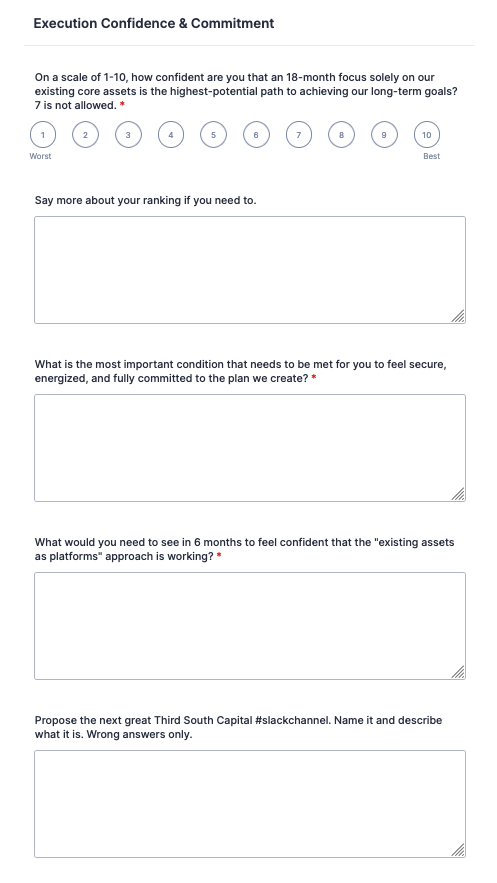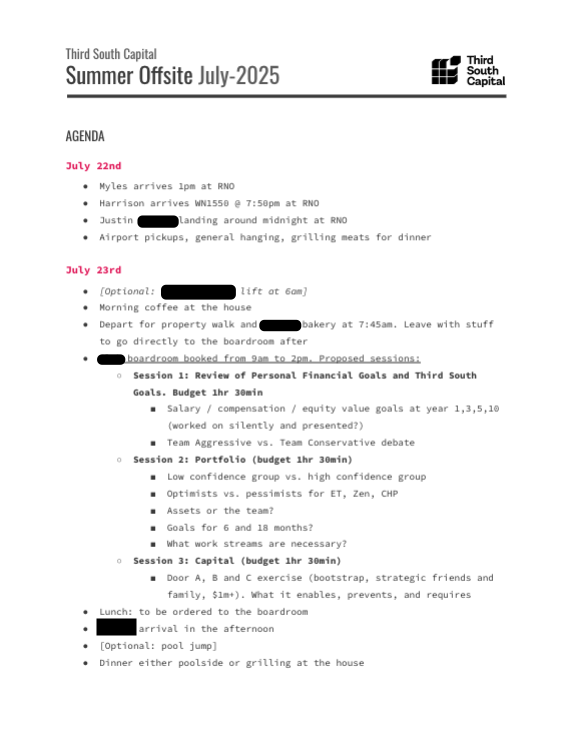The Offsite Blueprint: When, Why, and How Third South Does It
When and why to have an offsite

Third South has had two offsites this year, one in February and one in July. Here are some reflections that hopefully are helpful.
Our History with Offsites
We began Third South Capital with an accidental offsite. In late-2022, Colin visited Richmond to brainstorm about some entrepreneurial ideas with me and Justin. We didn't call that meeting an offsite at the time, but it was: it was the offsite that formed Third South. Once we started Third South formally, our basic plan was to meet in person once per year. At that time, we were each managing other full-time obligations, and Third South was a part-time project for all of us. During “Third South 1.0”, offsites essentially consisted of asking:
"What are the key goals to accomplish this year with our limited time and resources?"
And while that is always a good question to be asking, the size of our goals and resources has grown. Our new, full-time model for Third South has led to positive change in 2025. Business model pivots are a great time to have an offsite. In early 2025, we sensed it might be possible that Myles could be joining Third South. This in of itself qualified as a big enough pivot to necessitate getting together. So, we got together in Richmond.
With Colin and I joining the business full-time, we have once again been faced with the opportunity to make new decisions about how to best allocate our most finite resources (time and capital). And that meant getting together in Reno (where Colin lives) — which we just wrapped up a few weeks ago.
Our Offsite Rubric: When to Call for a Huddle
Hold an offsite when your business model is changing or when weekly task-oriented syncs aren't enough to propel the organization forward. Or, just when it makes sense to get people in the same room together.
Offsite Prep: Stop Making Fun of Me
I tend to be a bit of an over-preparer for things. Just ask my business partners. I must acknowledge, in the interest of full disclosure, I once kicked off an offsite session by saying "let's make this unstructured and informal" and then proceeded to outline a detailed agenda broken out into 30-minute sessions. My reputation for overplanning is deserved.
And so, I get made fun of, perhaps appropriately. But all kidding aside, I hope and believe my partners and I get a lot out of the prep process. Our prep for an offsite usually goes something like this:
Part One: Brainstorming
Ideas emerge about what we should discuss in the weeks leading up to the meeting.
We talk about some of items in a weekly call, but certain decisions about direction remain unresolved.
I try to synthesize key open topics and propose an initial agenda, usually organized around "what problems do we need to solve?"
We land on a draft agenda.
I then send out a survey to the partners (I consider this perhaps the most important part of prep; see below).
Part Two: Surveying
There's some real fun and seriousness to our survey process. It's not anonymous. I write some joke questions ("If Colin was stuck on a desert island, what two of these four things would he bring…?"). But we try to tackle the major themes and issues the firm is facing. Some questions vary by season ("how much equity capital are you comfortable investing this year?") and others are evergreen ("what are examples of some of the elephants in the room right now?"). I take a stab at writing the questions.
Everyone can then comment on the questions or add new ones. My favorite new question this year came from Myles, who asked us to rank a particular strategy we're considering on a 0-10 scale (and banned the use of 7!).

The more varying views, the better. Divergent answers, in fact, create a nice session agenda!
Part Three: Coalescing
For some reason, I'm always surprised by the amount of agreement our survey reveals. Ahead of the offsite, I convince myself that my friends and I have different views on strategic matters. And in some cases, we do. But in most important cases (vision and mission), we don't. The survey is a great tool to surface disagreements without emotion, ahead of a meeting, and it "clears the brush" on less important topics. In other words, it allows for the creation of a final agenda that hopes to actually answer the most important questions we need to consider.
Planning the Actual Offsite for Success
The Actual Calendar: Giving Space to Think
As for the actual calendar, we've found 2-3 days to be the ideal amount of time for an offsite. It gives space for relaxed strategic decisions that make way for focused tactical work, with the benefit of having breaks for workouts, family time, and catching up on other tasks. For Reno, we all got in Tuesday night. Our official schedule ran from Wednesday first thing to Friday at 10 AM. We continued to do important work into Friday night.

Clear Outcomes: Energized & Aligned
I want our team to leave the offsite feeling energized and strategically aligned for the months ahead. Anything else we accomplish for the benefit of Third South is secondary.
It's Not All Work: Balancing Focus with Fun
It can't be all work all the time. The host takes responsibility for planning non-TSC activities. In Richmond, we've visited Peak Experiences to rock climb, gone to workout classes, grilled at Justin's house, and enjoyed trail runs on the James River.
Colin hosted this summer, and he set us up with great dinners, outdoor activities, and workouts. Colin always gets us doing awesome outdoor stuff around Lake Tahoe. He and Myles spent Saturday morning doing a sprint triathlon (congratulations to them both, but particularly to Myles, his first!).

Time for Other Work: Minimizing Stress
The offsite shouldn't stress people out. It has to have a sufficient schedule to get work done while also allowing people to accomplish their time-sensitive, day-to-day tasks. We're particularly cognizant of pulling Justin away from Buttondown duties, as well as minding support inboxes across seven portfolio companies.
Freedom to Brainstorm: Moving Beyond the Desk
Post-It notes and whiteboards are huge for us. So is physical movement. If we are sitting and writing or typing for three hours, something has gone wrong.
A Family-Friendly Schedule: Open Invites & Support
All four of us are in committed, long-term relationships. Our partners (and Lucy!) have open invites to offsites. We try to make the schedules as family-friendly as possible. If this means giving significant others their go-to snacks in Colin's fridge or providing a place with a monitor and a keyboard so they can stay plugged into their responsibilities, we are going to provide what we can.
Financial Flexibility: Capital Well-Invested
We'll probably spend about 0.5% of our annual revenue on the offsite (mainly airfare and food). Is this a lot? I'm not sure. But we have limited office expenses and no in-person requirements, so it seems like capital well-invested.
Allow for (Sometimes Significant) Agenda Deviations: Embracing Flow
Some planners believe capping time spent on particular issues is a good facilitation tool. We don’t do this. The tradeoff is easy to calculate. I usually get anxious about not covering everything we need to. I try to set aside my anxiety. And we produce better results by allowing for creative discussion and processing time.
Parting Thoughts: One Guy's Views
Over the course of the 3 days, there were many times where I felt stuck. But I left unstuck. Some learnings I had in this spirit:
Embrace a Co-Leadership Model
While I tend to lead the offsites (spiritually), any given session or topic can be led by anyone. There's a natural alternation of roles. In one strategic session early-on, Colin, Justin, and I all felt stuck. Unprompted, Myles led us through a brainstorming exercise that got us moving again. Justin led sprint planning. The list goes on. It's great to have a well-balanced team.
Know Your Own Tendencies
I can be a binary thinker and lock in to mechanically framed options. It took us three days to decide on the next steps for our capital structure. The ultimate reason for the breakthrough was essentially Colin saying, "let's consider something beyond the two choices Harrison is offering."
No matter how aware I am of my tendency to frame in binary and my gravitation toward black and white, I sometimes need others' help to get unstuck. My tendency can also be helpful, allowing for focus on specific ideas and genuine vetting of pros and cons (which can lead to the brainstorming of other options in and of themselves). Which leads me to my next thought…
Give Time and Space
This is a little bit different of a point than the idea of allowing for agenda deviations. Sometimes, decisions need to get made when everyone feels aligned. No clock or schedule can force agreement. Lean into this.
Stare into the Void
"Staring into the void" sounds incredibly profound when Justin and Myles say it. While the phrase traditionally evokes confronting deep meaninglessness or existential despair, I've come to interpret it as: we must allow everyone to reside in discomfort, surface the true points of decision and disagreement, and do our best to come to focused answers.
And So?
I am really excited about the amount of work we got done in Reno. As we plan for our next offsite, we will work to incorporate these lessons and improve our time together. And keep having fun!
You just read issue #4 of Third South Capital. You can also browse the full archives of this newsletter.
Add a comment: